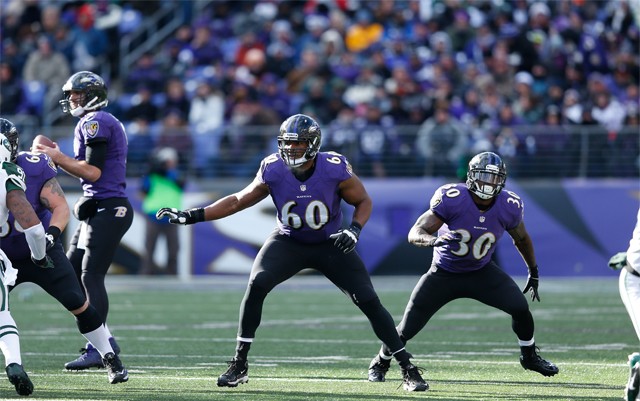We’ve reported in the past how former NFL players have gone public about their advocacy for medical cannabis to treat game-related injuries and chronic pain. American football is a brutal, violent game that often results in more traumatic injuries and brain damage than boxing or MMA. The NFL has been notoriously silent and ignorant about even looking into the possibility of allowing players to introduce cannabis into their pain management and rehabilitation methods. Cannabis use of any kind is banned by the NFL and the NFL Players Association – even in the offseason.
Some current players think it’s time for that to end, the most vocal of which being former Baltimore Ravens offensive tackle Eugene Monroe, who is entering his eighth season in the league. Highly ranked coming out of college, Monroe was the Jacksonville Jaguars’ first round pick in 2009. He was traded to the Ravens in 2013. On June 15, 2016, Baltimore released Monroe in a move the team claims has nothing to do with his medical cannabis advocacy. Just two years ago, the team signed him to a contract worth over $17 million guaranteed. Morone says his release by the Ravens won’t deter him from his campaign to get medical cannabis taken off the NFL’s banned substances list. With talented, veteran offensive linemen at a premium, some team should pick him up as a free agent. It would be a shame to see a player of Morone’s caliber in the prime of his career be blacklisted for trying to help his fellow players.
“The NFL relies heavily on opioids to get players back on the field as soon as possible, but studies have shown medical marijuana to be a much better solution,” Monroe wrote in an essay for The Player’s Tribune titled “Getting off the T Train.”
“Medical marijuana is safer, less addictive and can even reduce opioid dependence. I’m not asking the NFL to prescribe players cannabis. I’m calling on the league to remove its testing protocols for cannabis. It just makes sense,” Monroe continued.
In the essay, Monroe calls for the league and union to remove cannabis from the banned substance list, fund research for cannabis pain management, especially treating brain diseases and to stop overprescribing addictive and harmful opioids. He points out that every team that has won the Super Bowl since 2012 is in a state where the legislature has passed some form of progressive cannabis legislation, yet the NFL and NFLPA list it as a banned substance. He notes that at least half of all current and former NFL players have either heavily used opioids or have received some type of painkilling injection.
“Football is pain,” Monroe wrote. “There’s no way around it, and by no means am I complaining; it’s the sport I love. How can a league so casual about the use of addictive opioids take such a hard line on a drug that might provide a safer alternative? It is the responsibility of the NFL to care for its players. Nineteen players were suspended last season for testing positive for ‘substances of abuse,’ and for some, their careers may be over. Why? For using something that can actually help people?”
When asked about players using medical cannabis during the Super Bowl media week, NFL commissioner Roger Goodell regurgitated PR speak you’d expect from a prohibitionist politician. “Medical advisers have not indicated a need to change our policy on medical marijuana. We believe it’s the correct policy, for now, in the best interest of our players and the long-term health of our players,” Goodell told the sports media.
It looks like that stance has finally started to shift, ever so slightly. NBC Sports recently reported that some of the league’s top doctors participated in a conference call with researchers from Johns Hopkins and the University of Pennsylvania. Monroe has reportedly helped fund these researchers with an $80,000 donation.
While it’s a baby step, at least it’s a step in the right direction to help better protect the health of the players of America’s favorite sport. In addition to his donations, Monroe has set up a website to educate athletes about the benefits of medical cannabis.






